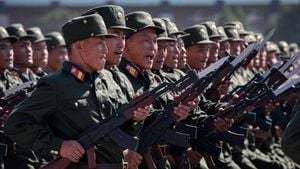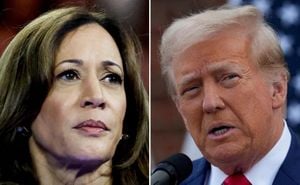With the looming U.S. presidential election, the nation is on edge, and nowhere is this anxiety more palpable than across various states where officials are implementing extensive security measures to safeguard the electoral process. The upcoming election is set for November 5, 2024, and candidates Donald Trump and Kamala Harris have both mobilized significant support and scrutiny, leading to heightened fears of unrest similar to what transpired during the tumultuous aftermath of the 2020 election.
Arizona, often viewed as the focal point of election disputes, is ramping up its security protocols. At the Maricopa County tabulation center, preparations resemble those typically associated with high-profile events, featuring razor wire, armed security guards, and metal detectors. Sheriff Russ Skinner has stated, "We do treat this like a major event, like the Super Bowl." The county's proactive approach is not without reason, as it has become the battleground for conspiracy theories and armed protests following the last presidential election, which Trump lost by fewer than 11,000 votes.
The aftermath of the 2020 election reshaped the way officials view the election process, transforming the once mundane task of counting ballots under the watchful eye of loved ones and friends to one fraught with heavy security measures. The sheriff's department is now well-versed in election laws, whether through training or on-the-ground experience, ensuring preparedness for any potential unrest.
Officials have been ramping up discussions around security measures, even contemplating drone surveillance and the presence of snipers to counter any threats to vote-counters and election workers. Skinner emphasized the department's commitment to ensuring the security of both the employees and the vote counting facility, stating, "Our hope is it doesn't arise to a level of need for [drones and snipers]... But we will be prepared." Adding to the atmosphere of uncertainty, the process of ballot counting is now livestreamed round-the-clock, enabling public viewing and fostering transparency.
Inevitably, these security enhancements come at a cost—financially, logistically, and socially. Maricopa County has invested millions of dollars since the 2020 elections, not just on security, but also on improving communication. With 30 communications staff members now focused on refuting misinformation, officials aim to shine light on every aspect of the voting process to restore public trust.
Meanwhile, security measures are spreading beyond Arizona. Across swing states like Nevada, where public protests challenged election integrity two years ago, officials are on high alert. Security fencing has been erected around key voting sites, and military support from the National Guard has been mobilized. States including Oregon, Washington, and Michigan are employing metal detectors, police patrols, and barricades, demonstrating how the specter of violence can overshadow the democratic process. Detroit’s preparedness includes visible police presence, with officers patrolling rooftops and ensuring safety within polling venues.
The decision to increase security measures stems from serious concerns about potential political violence. A recent report detailed how law enforcement monitors escalation within communities, with Sheriff's statements often reflecting the challenging climate. National mobilization of the National Guard draws attention to the seriousness of the situation, as nearly two dozen states have activated troops to assist local authorities, particularly during the unexpected surge of political tensions surrounding this election.
The focus on security highlights shifting public sentiment and the growing distrust among voters. Many Republican supporters still grapple with the integrity of the electoral system, citing prior experiences with voting processes. For example, some voters like Maleesa Meyers express deep-rooted skepticism, asserting, "I still think it was rigged... It's very hard to trust anyone today." On the other hand, others feel galvanised to take action, volunteering as poll watchers and actively engaging with the democratic process.
Local authorities continue to navigate the balance between safety and the candid openness expected of election proceedings. Many officials believe the extensive measures are necessary but lament the current climate. Maricopa County Supervisor Bill Gates, who has become increasingly wary of the election environment, acknowledges the impact of the heightened security, stating, "I think it is sad we’re having to do these things," when referencing the necessity of incorporating armed security and fencing around polling stations.
It's not just statewide initiatives; heightened security also spans across cities and counties with long-term impacts on how upcoming elections are viewed by constituents. The tight race between candidates Harris and Trump leaves observers with less certainty about how results might shake out. While both candidates aim to sway voters, the apprehension surrounding the potential for unrest hangs over the electoral proceedings.
The chilling backdrop of tightly controlled environments raises questions about public engagement and trust. Officials urge citizens to participate actively when they go to vote centers. Sheriff Skinner reassures the populace, asserting, "These are not militarized zones. You can feel safe to go there with your family, with your kids and participate in democracy."
Indeed, as the country gears up for election day, the events preceding it are closely monitored. The dynamics surrounding this election reveal not just partisan divides but also the pervasive apprehension among citizens about exercising their right to vote. The stakes have never felt higher, leading to these extraordinary measures, and whether they are enough to avert violence remains to be seen.
After all is said and done, the next few days will potentially set the narrative for the future of American democracy, reflecting how voters navigate their complex emotions amid tightly managed political environments. The intensity surrounding this election invites all to reconsider the relationship between safety, trust, and democracy itself, positioning the outcome of the election as not only significant nationally but with globally reverberation.



